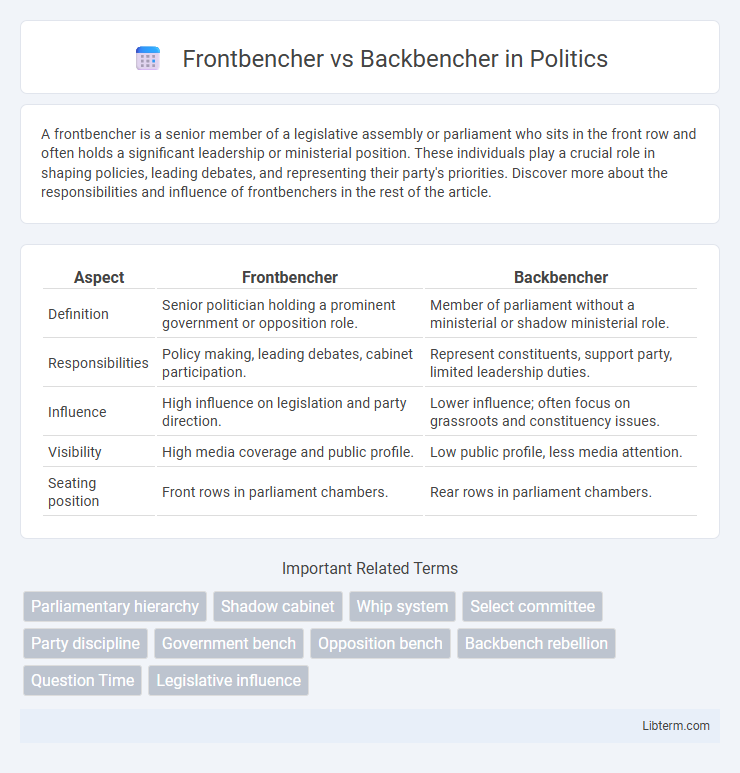A frontbencher is a senior member of a legislative assembly or parliament who sits in the front row and often holds a significant leadership or ministerial position. These individuals play a crucial role in shaping policies, leading debates, and representing their party's priorities. Discover more about the responsibilities and influence of frontbenchers in the rest of the article.
Table of Comparison
| Aspect | Frontbencher | Backbencher |
|---|---|---|
| Definition | Senior politician holding a prominent government or opposition role. | Member of parliament without a ministerial or shadow ministerial role. |
| Responsibilities | Policy making, leading debates, cabinet participation. | Represent constituents, support party, limited leadership duties. |
| Influence | High influence on legislation and party direction. | Lower influence; often focus on grassroots and constituency issues. |
| Visibility | High media coverage and public profile. | Low public profile, less media attention. |
| Seating position | Front rows in parliament chambers. | Rear rows in parliament chambers. |
Understanding Frontbenchers and Backbenchers
Frontbenchers are senior members of a legislative body or parliament who hold official positions such as ministers or shadow ministers, actively shaping government policies and decisions. Backbenchers are members without specific government roles, providing support, representing constituents, and offering critical oversight within parliamentary debates. Understanding the distinction between frontbenchers and backbenchers is crucial for grasping legislative dynamics and the distribution of political influence.
Key Roles and Responsibilities
Frontbenchers are senior members of a legislative body who hold executive positions or serve as spokespersons for their party, responsible for shaping policy, debating key issues, and leading legislative initiatives. Backbenchers primarily support their party through voting, representing constituents' interests, and participating in committee work, often influencing legislation indirectly without holding official leadership roles. Both roles are essential for parliamentary function, with frontbenchers driving party strategy and backbenchers ensuring grassroots representation and accountability.
Historical Origins of the Terms
The terms "Frontbencher" and "Backbencher" originate from the British parliamentary system, dating back to the 19th century when seating arrangements in the House of Commons reflected members' political influence and roles. Frontbenchers referred to senior government ministers and shadow cabinet members who sat on the front rows facing the Speaker, symbolizing authority and leadership within the party. In contrast, backbenchers were ordinary members of parliament without ministerial office, seated behind the frontbenchers, signifying their lesser influence in legislative decision-making.
Influence on Legislative Processes
Frontbenchers hold significant influence on legislative processes due to their roles as ministers or shadow ministers, allowing them to directly shape policy and propose legislation. Backbenchers, while less involved in policymaking, influence legislation through committee work, debates, and by representing constituency interests, often holding the government accountable. The dynamic between frontbenchers and backbenchers balances leadership-driven legislative initiatives with grassroots input and scrutiny within parliamentary systems.
Power Dynamics in Parliament
Frontbenchers hold significant power in parliament, occupying leadership roles such as ministers or party spokespeople with direct influence over policy decisions and legislative agendas. Backbenchers, positioned behind the frontbenchers, have limited formal authority but can impact power dynamics through committee participation and by voicing constituency concerns. The balance between frontbenchers' executive power and backbenchers' representational roles shapes parliamentary decision-making and party cohesion.
Public Perception and Stereotypes
Frontbenchers are often perceived as influential leaders or key decision-makers within political parties, embodying authority and expertise, while backbenchers are stereotyped as less powerful, primarily supporting roles with limited impact on policy. Public perception tends to view frontbenchers as ambitious and media-savvy, whereas backbenchers are seen as loyal, grassroots representatives or political outsiders. These stereotypes influence voters' expectations, assigning frontbenchers accountability for party direction and backbenchers the role of representing local interests and holding leadership to account.
Challenges Faced by Frontbenchers
Frontbenchers face intense scrutiny from both the media and opposition, requiring them to maintain a high level of expertise on policy issues and public communication. Managing the balance between party loyalty and constituency interests often creates significant pressure, especially during legislative debates. The demands of constant public visibility and accountability increase the risk of burnout and political vulnerability.
Opportunities for Backbenchers
Backbenchers in parliamentary systems have unique opportunities to influence legislation through committee memberships and private member bills, enabling them to raise issues not prioritized by party leadership. They can leverage constituency work to build grassroots support and enhance their political profile, potentially positioning themselves for future leadership roles. By actively participating in debates and policy discussions, backbenchers can shape party policy and hold the government accountable, despite limited access to ministerial positions.
Career Progression: Moving from Backbencher to Frontbencher
Career progression from backbencher to frontbencher involves gaining influence by actively participating in parliamentary debates, committee work, and party activities, demonstrating leadership qualities and expertise in policy areas. Building strong relationships within the party and consistently contributing to legislative processes increases visibility and can lead to appointments as spokesperson or shadow cabinet member. Successful transition requires strategic networking, accumulating experience, and aligning with party priorities to earn the trust necessary for frontbench responsibilities.
The Evolving Role in Modern Politics
Frontbenchers serve as senior members and key policymakers in legislative bodies, holding official positions such as ministers or shadow ministers, directly shaping party strategy and government policy. Backbenchers, while lacking formal ministerial roles, play a crucial role in representing constituency interests and influencing legislation through committee work and party debates. The evolving political landscape has seen backbenchers increasingly leverage social media platforms and public engagement to assert greater influence, challenging traditional hierarchies dominated by frontbench leaders.
Frontbencher Infographic

 libterm.com
libterm.com